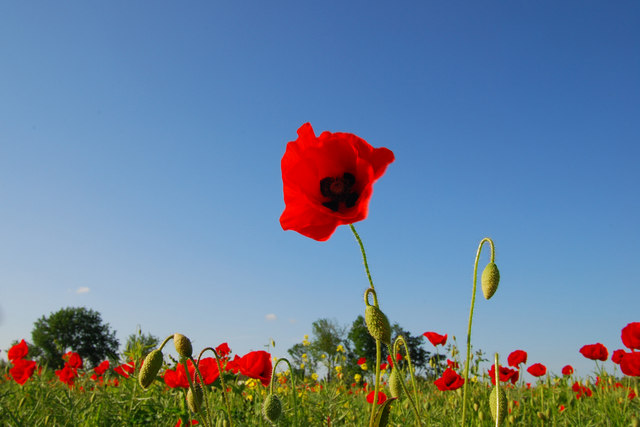
Every November, we donate our toonies and pin on our poppies. We do this to symbolize our respect to the fallen soldiers that have sacrificed their lives in the World Wars for our peace. By remembering all those who served, we also recognize the liberties that we take for granted from the cost of their ultimate sacrifice. Our wearing of the poppy is their time-endured memorial. So why the poppy flower (papaver rhoeas) specifically?
In natural conditions, the poppy can grow in circumstances of disturbed earth, as was seen throughout the destitute and bullet-riddled battlefields following the World Wars. In late 1914, the fields of northern Europe and Flanders were destroyed by trench digging and artillery bombardment—once conflict was over, the poppy was the only plant that could grow in an otherwise barren environment. The poppy flower had also covered barren land into fields of blood red over the bodies of fallen soldiers in the Napoleonic wars a century before. In this way, the poppy becomes a symbol and lasting memorial to the fallen, as was also realized by Canadian poet, surgeon, and soldier John McCrae (1872-1918) in his famous poem In Flanders Fields. Thus, the poppy flower became a lasting physical and symbolic memorial to those who died in WWI and later conflicts.
The World Wars touched the lives of Canadians of all races, genders, social classes, and ages; fathers, sons, daughters, and sweethearts alike suffered most terribly. Several Ancient Greek and Roman myths express that poppies were used as offerings to the dead. The white poppy is alternatively worn as a symbol of amity. The poppy is also attributed with sleep as the opium that is extracted from them is a sedative. The flower is therefore a rather powerful symbol of sufferings past, present, and future.
In the hustle and bustle of the modern world, we often take the values and institutions of the Canadian system for granted. We should not only remember our fallen heroes on this one day of the year, but every day of the year as our freedoms and rights were ultimately secured through their inconceivable anguishes and torments. By remembering the services of soldiers and civilians alike in war, we also recognize the freedom those men and women fought to preserve; insurance that the dream of peace can be realized.
The hallowed poppy will forever be associated with Remembrance Day because on this day, we are meant to honor the members of the armed forces that lay in rest under poppies in Flanders’ Fields. On this Remembrance Day, we acknowledge the courage and sacrifice of all those who served this country, and comprehend our task to work for the peace they fought hard to achieve. Consequently, the meaning of their sacrifices rests within our national collective consciousness—the respectful wearing of the poppy flower.
So, pin on your poppy, and Lest We Forget.
